微课语法_介词+关系代词引导的定语从句中介词的选择
- 格式:ppt
- 大小:2.86 MB
- 文档页数:45
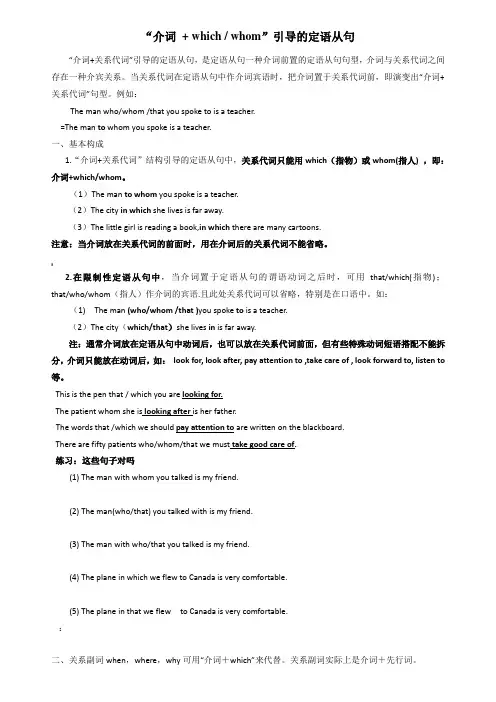
“介词+ which / whom”引导的定语从句“介词+关系代词”引导的定语从句,是定语从句一种介词前置的定语从句句型,介词与关系代词之间存在一种介宾关系。
当关系代词在定语从句中作介词宾语时,把介词置于关系代词前,即演变出“介词+关系代词”句型。
例如:The man who/whom /that you spoke to is a teacher.=The man to whom you spoke is a teacher.一、基本构成1.“介词+关系代词”结构引导的定语从句中,关系代词只能用which(指物)或whom(指人) ,即:介词+which/whom。
(1)The man to whom you spoke is a teacher.(2)The city in which she lives is far away.(3)The little girl is reading a book,in which there are many cartoons.注意:当介词放在关系代词的前面时,用在介词后的关系代词不能省略。
;2.在限制性定语从句中,当介词置于定语从句的谓语动词之后时,可用that/which(指物);that/who/whom(指人)作介词的宾语.且此处关系代词可以省略,特别是在口语中。
如:(1) The man (who/whom /that )you spoke to is a teacher.(2)The city(which/that)she lives in is far away.注:通常介词放在定语从句中动词后,也可以放在关系代词前面,但有些特殊动词短语搭配不能拆分,介词只能放在动词后,如:look for, look after, pay attention to ,take care of , look forward to, listen to 等。
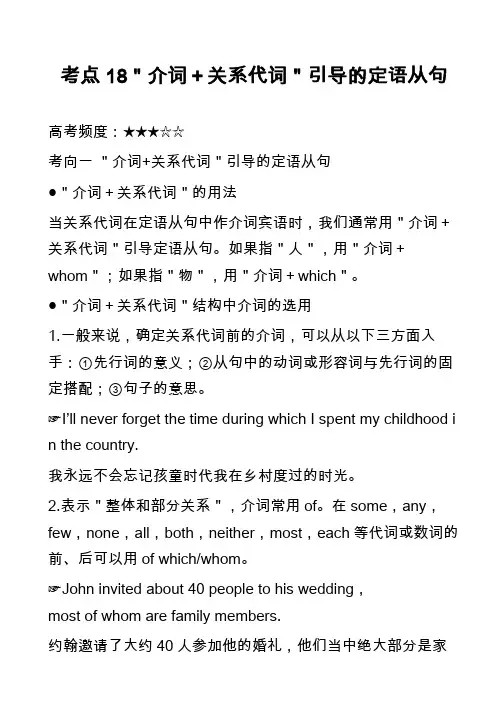
考点18"介词+关系代词"引导的定语从句高考频度:★★★☆☆考向一"介词+关系代词"引导的定语从句●"介词+关系代词"的用法当关系代词在定语从句中作介词宾语时,我们通常用"介词+关系代词"引导定语从句。
如果指"人",用"介词+whom";如果指"物",用"介词+which"。
●"介词+关系代词"结构中介词的选用1.一般来说,确定关系代词前的介词,可以从以下三方面入手:①先行词的意义;②从句中的动词或形容词与先行词的固定搭配;③句子的意思。
☞I’ll never forget the time during which I spent my childhood i n the country.我永远不会忘记孩童时代我在乡村度过的时光。
2.表示"整体和部分关系",介词常用of。
在some,any,few,none,all,both,neither,most,each等代词或数词的前、后可以用of which/whom。
☞John invited about 40 people to his wedding,most of whom are family members.约翰邀请了大约40人参加他的婚礼,他们当中绝大部分是家庭成员。
3.有时"介词+where"可以引导定语从句,此时要和"介词+which"引导的定语从句从意思上加以区别。
☞His head soon appeared out of the window,from where he saw nothing but trees.他的头很快从窗口探了出来,从那里除了树木他什么也看不到。
(from where相当于from out of the window,而不是from the window)●在定语从句中,含介词的短语动词不可拆开使用(短语拆开后含义发生变化),如look after, look for等。
●"of which / whom"有时可以用"whose+名词"结构来改写。
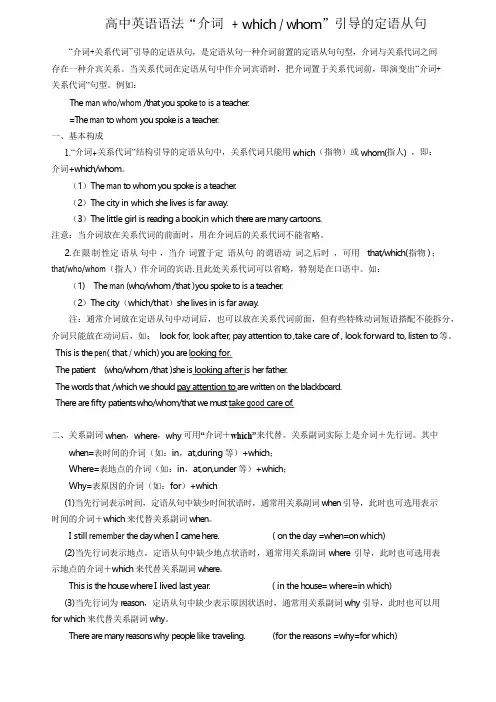
高中英语语法“介词+which/whom”引导的定语从句“介词+关系代词”引导的定语从句,是定语从句一种介词前置的定语从句句型,介词与关系代词之间存在一种介宾关系。
当关系代词在定语从句中作介词宾语时,把介词置于关系代词前,即演变出“介词+关系代词”句型。
例如:The man who/whom/th at you spok e to is a teacher.=The man to whom you spok e is a teacher.一、基本构成1.“介词+关系代词”结构引导的定语从句中,关系代词只能用which(指物)或whom(指人),即:介词+which/whom。
(1)The man to whom you spok e is a teacher.(2)The city in which she lives is far away.(3)The little girl is reading a book,in which there are many cartoons.注意:当介词放在关系代词的前面时,用在介词后的关系代词不能省略。
2.在限制性定语从句中,当介词置于定语从句的谓语动词之后时,可用that/which(指物);that/who/whom(指人)作介词的宾语.且此处关系代词可以省略,特别是在口语中。
如:(1)The man(who/whom/that)you spok e to is a teacher.(2)The city(which/that)she lives in is far away.注:通常介词放在定语从句中动词后,也可以放在关系代词前面,但有些特殊动词短语搭配不能拆分,介词只能放在动词后,如:look for,look after,pay attention to,take care of,look forward to,listen to等。
This is the pen(that/which)you are looking for.The patient(who/whom/that)she is looking after is her father.The words that/which we should pay attention to are written on the blackboard.There are fifty patients who/whom/that we must take good care of.二、关系副词when,where,why可用“介词+which”来代替。
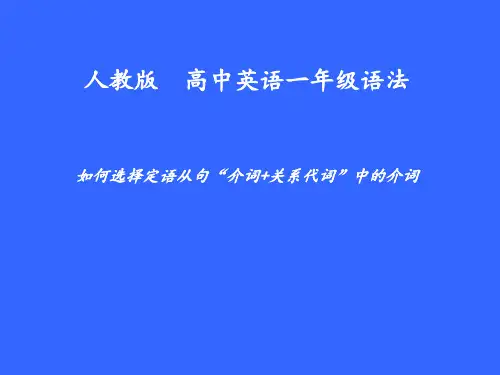
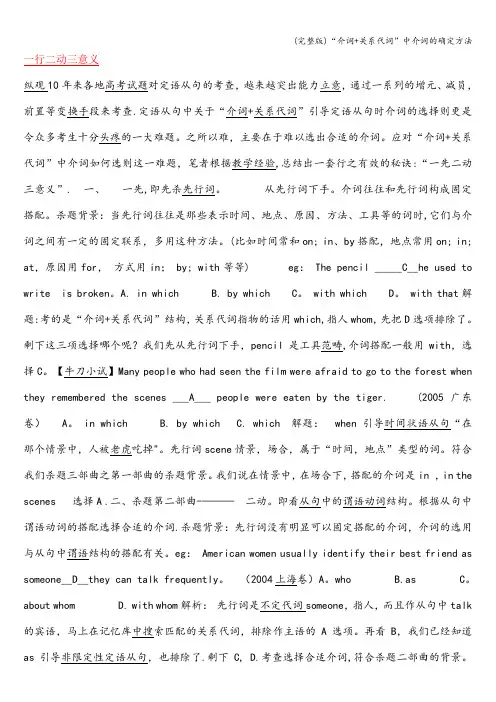
一行二动三意义纵观10年来各地高考试题对定语从句的考查,越来越突出能力立意,通过一系列的增元、减员,前置等变换手段来考查.定语从句中关于“介词+关系代词”引导定语从句时介词的选择则更是令众多考生十分头疼的一大难题。
之所以难,主要在于难以选出合适的介词。
应对“介词+关系代词”中介词如何选则这一难题,笔者根据教学经验,总结出一套行之有效的秘诀:“一先二动三意义”.一、一先,即先杀先行词。
从先行词下手。
介词往往和先行词构成固定搭配。
杀题背景:当先行词往往是那些表示时间、地点、原因、方法、工具等的词时,它们与介词之间有一定的固定联系,多用这种方法。
(比如时间常和on; in、by搭配,地点常用on; in; at,原因用for,方式用in; by; with等等) eg: The pencil _____C__he used to write is broken。
A. in which B. by which C。
with which D。
with that解题:考的是“介词+关系代词”结构,关系代词指物的话用which,指人whom,先把D选项排除了。
剩下这三项选择哪个呢?我们先从先行词下手,pencil是工具范畴,介词搭配一般用with,选择C。
【牛刀小试】Many people who had seen the film were afraid to go to the forest when they remembered the scenes ___A___ people were eaten by the tiger. (2005广东卷) A。
in which B. by which C. which 解题:when 引导时间状语从句“在那个情景中,人被老虎吃掉"。
先行词scene情景,场合,属于“时间,地点”类型的词。
符合我们杀题三部曲之第一部曲的杀题背景。
我们说在情景中,在场合下,搭配的介词是in ,in the scenes 选择A .二、杀题第二部曲-———二动。
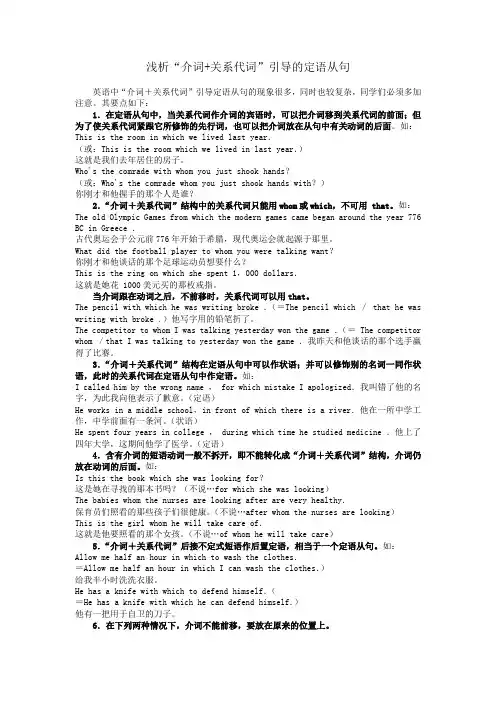
浅析“介词+关系代词”引导的定语从句英语中“介词+关系代词”引导定语从句的现象很多,同时也较复杂,同学们必须多加注意。
其要点如下:1.在定语从句中,当关系代词作介词的宾语时,可以把介词移到关系代词的前面;但为了使关系代词紧跟它所修饰的先行词,也可以把介词放在从句中有关动词的后面。
如:This is the room in which we lived last year.(或:This is the room which we lived in last year.)这就是我们去年居住的房子。
Who's the comrade with whom you just shook hands?(或:Who's the comrade whom you just shook hands with?)你刚才和他握手的那个人是谁?2.“介词+关系代词”结构中的关系代词只能用whom或which,不可用 that。
如:The old Olympic Games from which the modern games came began around the year 776 BC in Greece .古代奥运会于公元前776年开始于希腊,现代奥运会就起源于那里。
What did the football player to whom you were talking want?你刚才和他谈话的那个足球运动员想要什么?This is the ring on which she spent 1,000 dollars.这就是她花 1000美元买的那枚戒指。
当介词跟在动词之后,不前移时,关系代词可以用that。
The pencil with which he was writing broke .(=The pencil which / that he was writing with broke .)他写字用的铅笔折了。
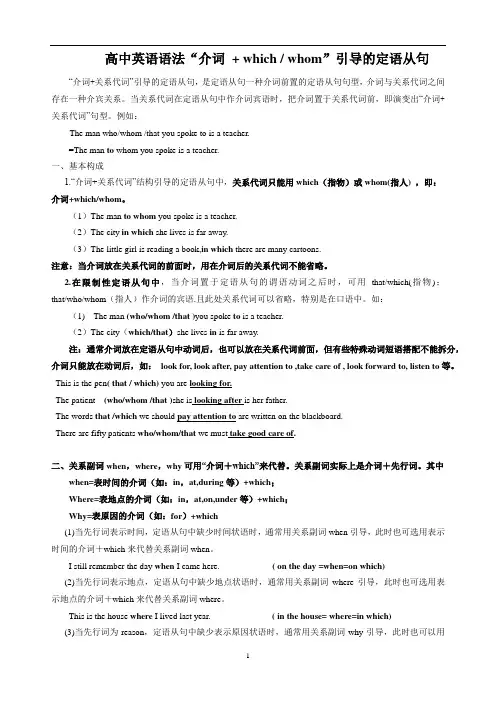
高中英语语法“介词+ which / whom”引导的定语从句“介词+关系代词”引导的定语从句,是定语从句一种介词前置的定语从句句型,介词与关系代词之间存在一种介宾关系。
当关系代词在定语从句中作介词宾语时,把介词置于关系代词前,即演变出“介词+关系代词”句型。
例如:The man who/whom /that you spoke to is a teacher.=The man to whom you spoke is a teacher.一、基本构成1.“介词+关系代词”结构引导的定语从句中,关系代词只能用which(指物)或whom(指人) ,即:介词+which/whom。
(1)The man to whom you spoke is a teacher.(2)The city in which she lives is far away.(3)The little girl is reading a book,in which there are many cartoons.注意:当介词放在关系代词的前面时,用在介词后的关系代词不能省略。
2.在限制性定语从句中,当介词置于定语从句的谓语动词之后时,可用that/which(指物);that/who/whom(指人)作介词的宾语.且此处关系代词可以省略,特别是在口语中。
如:(1) The man (who/whom /that )you spoke to is a teacher.(2)The city(which/that)she lives in is far away.注:通常介词放在定语从句中动词后,也可以放在关系代词前面,但有些特殊动词短语搭配不能拆分,介词只能放在动词后,如:look for, look after, pay attention to ,take care of , look forward to, listen to等。
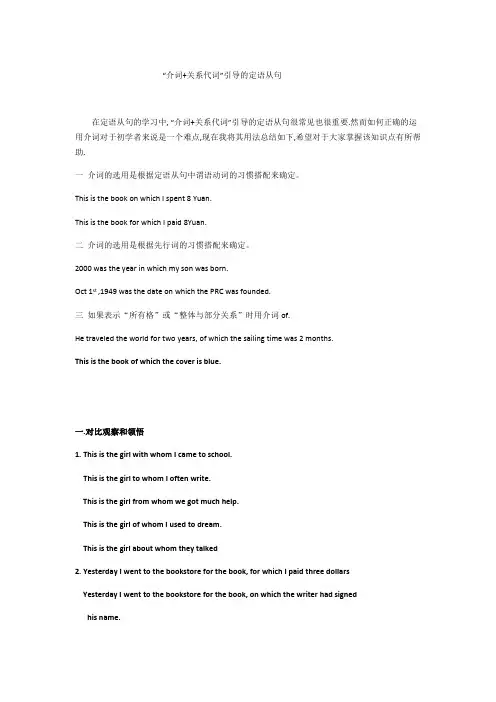
“介词+关系代词”引导的定语从句在定语从句的学习中, “介词+关系代词”引导的定语从句很常见也很重要.然而如何正确的运用介词对于初学者来说是一个难点,现在我将其用法总结如下,希望对于大家掌握该知识点有所帮助.一介词的选用是根据定语从句中谓语动词的习惯搭配来确定。
This is the book on which I spent 8 Yuan.This is the book for which I paid 8Yuan.二介词的选用是根据先行词的习惯搭配来确定。
2000 was the year in which my son was born.Oct 1st ,1949 was the date on which the PRC was founded.三如果表示“所有格”或“整体与部分关系”时用介词of.He traveled the world for two years, of which the sailing time was 2 months.This is the book of which the cover is blue.一.对比观察和领悟1. This is the girl with whom I came to school.This is the girl to whom I often write.This is the girl from whom we got much help.This is the girl of whom I used to dream.This is the girl about whom they talked2. Yesterday I went to the bookstore for the book, for which I paid three dollarsYesterday I went to the bookstore for the book, on which the writer had signedhis name.Yesterday I went to the bookstore for the book, to which I was asked to pay attention. Yesterday I went to the bookstore for the book, of which we are fond.Yesterday I went to the bookstore for the book, about which our teacher had talked二.实战演练1. He is the man _________ you can turn for help.2. Is this the book _________ you paid ten yuan?3.The farm_____ we worked ten years ago isn’t what is used to be.4. This is the factory _____________ he worked ten years ago5. It was in 1952 and Mandela was the black lawyer _______ I went for advice.6. He was generous with his time, ________ I was grateful.7. The parts of town _________ they had to live were decided by white people.8. We were put into a position _________we had either to accept we were less important, or fight the government.Keys: 1.to whom 2. for which 3.on which 4.at which5. to whom6.for which7.in which8.in which。
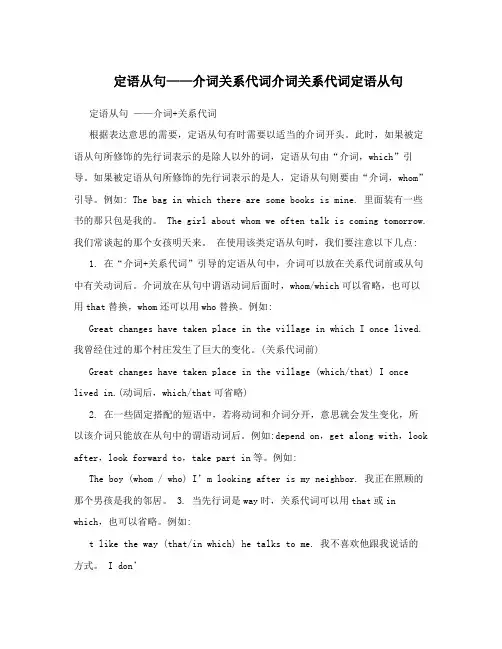
定语从句——介词关系代词介词关系代词定语从句定语从句——介词+关系代词根据表达意思的需要,定语从句有时需要以适当的介词开头。
此时,如果被定语从句所修饰的先行词表示的是除人以外的词,定语从句由“介词,which”引导。
如果被定语从句所修饰的先行词表示的是人,定语从句则要由“介词,whom”引导。
例如: The bag in which there are some books is mine. 里面装有一些书的那只包是我的。
The girl about whom we often talk is coming tomorrow. 我们常谈起的那个女孩明天来。
在使用该类定语从句时,我们要注意以下几点:1. 在“介词+关系代词”引导的定语从句中,介词可以放在关系代词前或从句中有关动词后。
介词放在从句中谓语动词后面时,whom/which可以省略,也可以用that替换,whom还可以用who替换。
例如:Great changes have taken place in the village in which I once lived. 我曾经住过的那个村庄发生了巨大的变化。
(关系代词前)Great changes have taken place in the village (which/that) I once lived in.(动词后,which/that可省略)2. 在一些固定搭配的短语中,若将动词和介词分开,意思就会发生变化,所以该介词只能放在从句中的谓语动词后。
例如:depend on,get along with,look after,look forward to,take part in等。
例如:The boy (whom / who) I’m looking af ter is my neighbor. 我正在照顾的那个男孩是我的邻居。
3. 当先行词是way时,关系代词可以用that或in which,也可以省略。
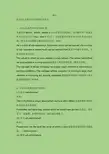
语法由介词+关系代词引导的定语从句1. 介词+关系代词中介词的位置关系代词whom,which,whose在从句中作介词宾语时,可以跟介词一起放在从句与主句之间(that,who不可以),也可以把介词放在从句中有关动词的后面,使关系代词紧跟它所修饰的先行词。
例如:He is a man of rich experience, from whom much can be learned.=He is a man of rich experience, whom much can be learned from.他是个经验丰富的人,从他那里能学到很多。
The school in which he once worked is a key school.=The school (which/that) he once worked in is a key school.他曾经工作过的学校是一所重点学校。
The manager in whose company I work pays much attention to improving our working conditions.=The manager whose company I'm working in pays much attention to improving our working conditions.我就职的那家公司的经理十分注意改善我们的工作条件。
2. 介词+关系代词的常见结构(1) 介词+which/whom例如:This is the famous singer about whom we have often talked.这就是那位我们经常谈论的著名歌唱家。
Fortunately we had a map, without which we would have got lost.很幸运,我们带了一张地图,如果没有的话,我们就会迷路了。
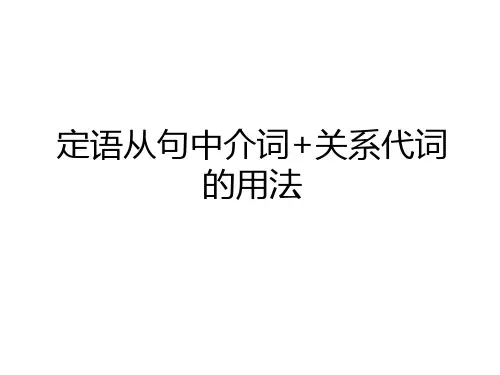
介词+关系代词“介词+关系代词"引导的定语从句是定语从句的一种复杂形式,这类定语从句的关系代词主要有which ,whom , whose , 它们既可以引导限定性定语从句,也可以引导非限定性定语从句.关系代词前该选用什么样的介词,要根据不同的语境、习语、惯用法等来决定。
一.介词选择的主要标准1.介词与定语从句的先行词是一种习惯性搭配Human facial expressions differ from those animals in the degree to which they can be controlled on purpose.人类的面部表情和动物的面部表情就可控制的程度来说是不一样的。
( to a degree )The gentleman about whom you told me yesterday proved to be a thief.你昨天告诉我的那个绅士被证明是个小偷。
( tell sb. about sb./ sth. )The English play in which my students acted at the New Year’s party was a great success。
那场在新年晚会上我学生参加表演的英语剧很成功。
( in the play )The schools themselves admit that not all children will be successful in the jobs for which they are being trained.学校本身承认,并不是所有的孩子都能在他们所接受的培训的职业成功.( be trained for the job )2.介词与定语从句中的动词是一种习惯性搭配Who is the man with whom our teacher is shaking hands?我们的老师与之握手的那个男士是谁? ( shake hands with sb. )Last month , part of Southeast Asia was struck by floods ,from whose effects the people are still suffering。
Grammar “介词+关系代词”引导的定语从句[学习目标]:1.明确“介词+关系代词”各种形式以及用的场合2. 介词+关系代词中介词的选择依据。
3.定语从句做题步骤[学习重难点]:介词+关系代词中介词的选择依据。
一.自学释疑1.认识介词+关系代词基本构成和含义观察下面的句子指出先行词、从句、引导词的形式及原因Eg.1 There comes Tom,(for whom )I have been waiting for an hour先行词引导词从句原因:wait for sb 先行词:人故用for whom2. We came to a place to which they had never paid a visit before.3.This is the teacher without whom I couldn’t have made such great progress4. Yinghe river used to be a clean river in which (=where) we could see manyfish swimming freely.5. She doesn’t tell me the reason for which(=why) she was late for school.6. I can still remember the exact day on which(=when) I got the first place in the exam.归纳:(1)“介词+关系代词”引导的定语从句,先行词指物用介词+__________先行词指人则用介词+___________(2)介词+ which:做时间状语=________;做地点状语=_______ ;做原因状语(for which)=_________二.课堂重点突破1).基本形式运用a 完成句子1.The man ___________(与……交谈)my parents was talking is our headmaster.2.China has lots of islands, one of ________is Hainan Island.3.China has lots of islands, and one of ________is Hainan Island.4.The factory _________ I worked was far from my hometown5.The factory_________ I visited was far from my hometown. b.句型转换(1) She’ll never forget the days when she worked with her friends in the places of interest= She’ll never forget the days ______________ she worked with her friends inthe places of interest(2) The students didn’t give the reason why he was absent from the class.= The students didn’t give the reason __________ he was absent from the class.定语从句做题步骤___________________________________________________________________________________________________________________________________ _____________________________________________________________________2)介词+关系代词中介词的选择依据1.Have you found the book _____ which I spent 39 dollars? (spend on)2.This is the man ______whom I learned the good news (learn from)3.This is the student ____whom I came to the village (with the student)4There is a tall tree outside, _______which stands our teacher.(under the tree)归纳:(1)根据定语从句中的_________或形容词来确定介词(习惯搭配)(2)根据定语从句中修饰的_____ (表示时间,地点,原因,方法)来确定介词高考链接1.America women usually identify their best friend as someone_______ they can talkfrequently (2009上海卷)A. whoB. asC. about whomD. with whom2. Maria has written two novels, both of ______have been made into television series. (2012山东)A. themB. thatC.whichD. what.3. The English play_____ my students acted at the NewYear’s party was a great success (2011全国卷)A for which B. at which C. in which D. on which.完成句子1.Her bag, _________she put all her books has been found2.Wu dong, _______ I went to the concert, enjoyed it very much.3)“介词+关系代词”的拓展1.The house, ____ was destroyed in the terrible fire, has been repairedA. the roof of whichB. which roofC. its roof D the roof2. This is the largest clock in the world, _____ the minute hand is six metres longA. thatB. of whichC. whichD. whose3. The old man has three sons, _______ is a doctor.A. all of themB. all of whomC. both of themD. none of whom4. I was given three books on cooking, the first _______ I really enjoyed.A. of thatB. of whichC. thatD. which用定语从句把下面的句子合并成一个句子a.She has two daughters. One of them is a teacher.S She has two daughters, ___________________________________b.Mary lives in a big beautiful house. The windows of the house face the sea.Mary lives in a big beautiful house, ____________________________________________________face the sea.归纳:(1)表示部分的词+______ +关系代词可以引导定语从句(2)名词+介词+关系代词的常见句型:a. the + n+ of+ 关系代词b. ______________________c.______________________三.延伸拓展单项选择(高考链接)1.In our class there are 46 students, ______ half wear glasses.A.in whomB. in themC. of whomD. of them.2.English is a language shared by several cultures, each of _____uses it differently.A.whichB. whatC. themD. those3.Gun control is a subject _______ Americans have argued for a long time.A.of whichB. with whichC. about whichD. into which4.The man pulled out a gold watch, _______ were made of small diamonds.A.the hands of whomB. whom the hands ofB.which the hands of D. the hands of which5.Is this just the city ______ the foreign guests wish to pay a visit_____A. which; toB. to which; /C. that; toD. to that;/6. He has lost the key to the drawer______ the papers are kept.A. whereB. on whichC. under whichD. whichPractice (语法填空)There have been many popular bands in the world ,________ the most famous was the Beatles. The four young men ____made up the band only performed and recorded from 1963 to 1970. During those years they gave many concerts, _____they played all their latest songs. They made many records,______ they will be remembered. Their songs were a mixture of rock and roll, _____ they often wrote about their own lives and problems. Although they were not trained actors they took part in films ________ they often played themselves. Their performances were humorous and interesting. Their fans, ______________ the Beatles would not have been so famous.四.Summary五Home workTask1:Translate1.她就是我要介绍给你们的新老师。
语法中的定语从句的引导词和位置要求定语从句是语法中的一个重要概念,它能够向我们提供更多的相关信息,进一步修饰名词。
在定语从句中,引导词的选择和位置是需要特别注意的。
本文将详细介绍定语从句中引导词的分类及其位置要求。
一、引导词的分类在定语从句中,引导词根据其功能和位置可分为以下几类:关系代词、关系副词、介词+关系代词/副词。
1. 关系代词:关系代词在定语从句中担任名词的角色,可以引导主语、宾语、表语或介词短语。
常用的关系代词有:that, which, who, whom, whose。
例如:- I have a friend who is a doctor.(who引导主语从句)- The book that you lent me is very interesting.(that引导宾语从句)2. 关系副词:关系副词在定语从句中指示地点、时间或原因,相当于介词+which。
常用的关系副词有:where, when, why。
例如:- This is the house where I was born.(where引导地点状语从句)- Do you still remember the day when we first met?(when引导时间状语从句)3. 介词+关系代词/关系副词:在定语从句中,介词加上关系代词或关系副词构成一个介词短语,在句中充当介词的宾语。
常用的介词有:of, in, on, to, with等。
例如:- This is the car with which she won the race.(with引导介词短语)- I still remember the teacher to whom I owe a lot.(to引导介词短语)二、引导词的位置要求在定语从句中,引导词的位置与它在从句中的作用相关。
一般来说,引导词需要位于定语从句中所修饰的名词之后,但也存在一些特殊情况。
“介词+关系代词”中介词的选用定语从句是高一英语语法的重难点,同时又是高考必考热点之一。
纵观10年来各地高考试题对定语从句的考查,越来越突出能力立意。
定语从句中关于“介词+关系代词”引导定语从句时介词的选择则更是令众多考生十分头疼的一大难题。
之所以难,主要在于难以选出合适的介词。
而介词的选用是有一定规律的,同学们只要掌握了这些规律,解题时就可迎刃而解,举一反三了。
一、根据定语从句中的线索来选用介词这线索可以是:1.定语从句中的短语动词这是主要线索,所选介词需与动词搭配。
例如:⑴ She paid the man from whom she had borrowed some money.(=She paid the man.She had borrowed some money from him.)(borrow sth.from sb.意思是“向某人借东西”)⑵ In the dark street, there wasn't a single person to whom she could turn for help.(NMET 1992)(turn to sb.for help,意思是“求某人帮助”)在这一句式结构中,句中的介词与从句的谓语动词有一定的搭配关系。
介词可用于关系代词之前,但先行词若指人,关系代词必须用whom,不能用who或that;若指物必须用which,不能用that。
介词也可以置于从句谓语动词之后,这时,句中关系代词用who,whom,that均可,指物可用which或that,并均可省略。
例如:The middle-aged woman to whom I spoke just now is my English teacher.[=The middle-aged (womanwho/whom/that) I spoke to just now is my English teacher.]2.定语从句中的形容词短语所选介词与形容词构成短语。